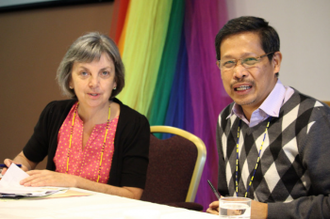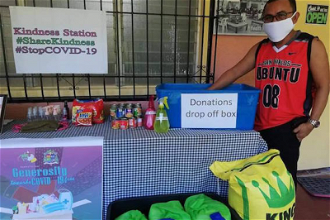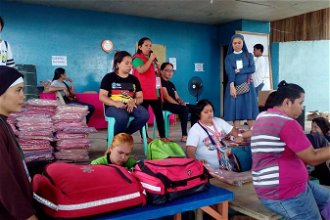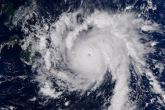Peace and Justice Ministry in the Philippines

Pat Gaffney of Pax Christi with Fr Edwin Gariguez
The following address was given at the 37th Annual Conference of the National Justice and Peace Network of England and Wales - 17-19 July 2015 by the Executive Secretary of Caritas Philippines-National Secretariat for Social Action.
I came from Mindoro island, one of the largest food producing provinces in the Philippines. It is also considered the seventh most important biodiversity hotspot in the world.
As a Catholic priest, it is for my mission to serve the poor that I dedicate myself to development work, and in promoting the rights of the marginalised. I worked for the Mangyan Mission, a Church-based NGO promoting the rights of the indigenous communities. As a missionary priest, I work to empower leaders and indigenous communities to defend their rights to the land. Along with the task of evangelization, we also promote participatory and self-determined development programs.
Development work and championing the cause of the poor and exploited sectors in society often have untoward repercussions particularly for the advocates of social change. We have become easy targets for counter-insurgency operations of the military. During the height of counterinsurgency period in 2003, people suspected of being rebel sympathizers were tortured, decapitated, or summarily executed. I, myself was tagged by the Army Intelligence as one of the dissident-terrorists (DT). And I was targeted for summary execution by the military hit squad. I needed to leave for a while. But I was not totally intimidated. I returned to continue the advocacy work for the poor and for the protection of our threatened environment.
Our province of Mindoro is a fragile island ecosystem. The rate of degradation of the forest in the island of Mindoro is alarming. From the 967,400 hectares of forest in the 1950s, the remaining forest cover at present is only about 50,000 hectares. The significant forest lost of 95% contributes to the instability of the environment both in the upland and lowland areas.
But instead of restoring the balance, the forest ecosystems are now even more in danger of being denuded due to the threats posed by more than 92 mining applications all over the island of Mindoro. And this aggressive promotion of mining by our government was happening all over the country.
Clearly, conflict in access and control of resources is prominently at play in this given situation - with the powerful transnational companies colluding with the state machineries to gain dominance in contested mineral areas being claimed by the marginalized sectors of the indigenous communities.
With the liberalisation of the mining industry, the applications of the transnational corporations came pouring in, targeting mineral rich area mostly located in the mountainous part of the country inhabited by the indigenous communities. Evidently, large-scale mining, in our small island, threatens the very survival of the indigenous peoples because a big part of the mining tenement overlaps with the ancestral lands of the tribe. In the Philippines, 53% of the mining applications overlap with the ancestral domain claim of the indigenous peoples (ESSC-BBC, 1999).
In this case, mining within the ancestral domain constitutes an outright land-grabbing of the transnational corporations under the guise of bringing in the so-called development. The encroachment of transnational mining corporations on the ancestral lands will eventually result to a much wider scale displacement of the indigenous peoples from their land. For the indigenous peoples land is life, and mining in the ancestral lands will destroy life!
The Catholic Bishops Conference of the Philippines (CBCP), expressed their concern about the alarming resource conflict in the context of extractive industry. The bishops highlighted the damaging and irreparable impacts on the indigenous communities:
"The promised economic benefits of mining by these transnational corporations are outweighed by the dislocation of communities especially among our indigenous brothers and sisters, the risks to health and livelihood and massive environmental damage. Mining areas remain among the poorest areas in the country . . . The cultural fabric of indigenous peoples is also being destroyed by the entry of mining corporations." (CBCP, 2006)
However, the impacts of large-scale mining are also shared by other vulnerable sectors, particularly the farmers living in downstream communities. In effect, mining will damage the island's important food production capacity.
The Philippine government's near-fanatical endorsement of mining as the engine for development and poverty alleviation is totally misleading, for it only counts the investment contribution, while leaving behind more important considerations in the equation.
A study conducted on the concerns and conflicts related to mining in the Philippines had the same observation: "Mining in the Philippines is being developed at a speed . . . scale . . . and in a manner likely to cause massive long-term environmental damage and social problems. Current mining plans will undermine the Government's own strategy for sustainable development by destroying or severely damaging critical eco-systems, including watersheds, rivers, marine eco-systems and important agricultural production areas." (Doyle, C., Wicks, C. and Nally, F., 2007)
Development, when pursued primarily for financial benefits without real consideration of human and ecosystems well being is a distorted version of development. The inherent defect is the notion that development is often equated with delivery of the much-needed investment, which is often achieved at the expense of social and ecological equilibrium.
Using the lens of the Catholic Social Teachings, we see the need to go beyond the myopic monetary valuation of our natural resources to give weightier consideration to the demand for ecological protection, promotion of environmental justice and the common good. We need to recognize the flaw in the market framework which regards the natural resources as something to be exploited rather than a crucial reserve to be sustained and protected in order to preserve the ecological balance and to ensure sustainability for all - both for the human community and the threatened ecosystems.
Pope Francis most recent encyclical, Laudato Si, questions the myopic economic argument in view of higher cost of damage to the environment: "Caring for ecosystems demands far-sightedness, since no one looking for quick and easy profit is truly interested in their preservation. But the cost of the damage caused by such selfish lack of concern is much greater than the economic benefits to be obtained . . . We can be silent witnesses to terrible injustices if we think that we can obtain significant benefits by making the rest of humanity, present and future, pay the extremely high costs of environmental deterioration." (36).
In a parallel way, the Philippines Church challenges the government policy on mining on the ground of the requirement for justice and common good. It categorically declares that mining destroys life. The Bishops Conference further argues that "the right to life of people is inseparable from their right to sources of food and livelihood. Allowing the interests of big mining corporations to prevail over people's right to these sources amounts to violating their right to life. Furthermore, mining threatens people's health and environmental safety through the wanton dumping of waste and tailings in rivers and seas" (CBCP, 2006).
In the Church, we pursue our advocacy for a sustainable ecology because it is part of our Christian responsibility. With the late Pope John Paul II, we believe that "Christians, in particular, realize that their responsibility within creation and their duty towards nature and the Creator are an essential part of their faith" (Pope John Paul II, 1991).
In a similar way, Pope Benedict XVI underlines our Christian responsibility to promote peace in the whole creation: ". . . humanity, if it truly desires peace, must be increasingly conscious of the links between natural ecology, or respect for nature, and human ecology. Experience shows that disregard for the environment always harms human coexistence, and vice versa. It becomes more and more evident that there is an inseparable link between peace with creation and peace among men. Both of these presuppose peace with God" (Benedict XVI, 2007).
The biblical Hebrew word for peace is "shalom," which refers not only to inner experience of serenity but to the integral sense of well-being and completeness, not only on personal level but in societal realm as well. Peace is not only the absence of war or hostility but the experience of justice, righteousness, prosperity and solidarity, even with creation.
The 2nd Plenary Council of the Philippines affirms this notion of peace and encourages us to work for the kind peace that we need to pursue in the contemporary context: "Peace . . . is harmony in the human heart and in the social order brought about by justice, requiring respect for human dignity and human rights, the promotion of the common good by one and all, and the constant practice of solidarity." (PCP II, Acts No. 307)
Hence, the Church's work for peace is to be pursued in the arena of social order - in its dedication and unfailing commitment to promote justice and common good and to protect the human dignity and to bring about social transformation so that the Kingdom of God that Jesus proclaimed will truly be a reality in our midst.
"The things that make for peace" will also have to consider the impacts of the continuing ecological destruction in relation to the worsening poverty situation of the people. Large-scale mining is big issue, but climate change is far more threatening and it spells greater suffering for the poor.
In January 2015, Pope Francis visited the Philippines to express his solidarity with the communities devastated by the typhoon Haiyan. Our office, Caritas Philippines submitted a letter to the Pope underlining the link between climate change and extreme weather disturbances like Haiyan and appealing for the Church moral intervention on the issue.
Clearly, climate change and its ensuing extreme weather impact is hurting the most vulnerable countries, like the Philippines. In terms of social groups, small farmers, fishers, indigenous peoples, women and children are identified as the most vulnerable sectors affected by climate change as it threatens both their lives and livelihood. Climate change-induced disasters spell indescribable miseries to our people.
For the Church, climate change and mining are urgent issues that are clearly related to our Christian responsibility to care for the earth and to care for the poor and vulnerable in our midst. The social teachings of the Church are replete with pastoral exhortations invoking for environmental stewardship, social and inter-generational justice, the use of earth's resources for common good, authentic development, and service for the poor. All those principles are at stake of being violated when we do not avert or address the causes of climate change and ecological destruction.
In 2012, I was chosen by the Goldman Environmental Prize as one of the six grassroots environmental heroes, globally. And when I received the prize, I shared the basic principle guiding our campaign, which is but a reiteration of the Church social teaching:
"Protecting the rights of the poor must take precedence over corporate greed. Genuine development must prioritize the need to ensure ecological sustainability over market profitability. We should never sacrifice people and the environment for short-term benefit of the few."
Video - Fr Edwin Gariguez 2012 Goldman Prize Winner


















